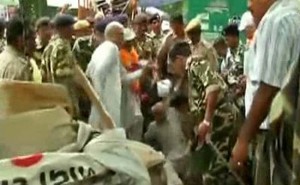Delhi Police Backs Off Army Veterans’ Protest
 NEW DELHI: Pictures of Army veterans being pushed around in Delhi drew immediate public uproar, forcing the city’s police to back off protests that it tried to truncate at Jantar Mantar, the capital’s designated spot for public protests.
NEW DELHI: Pictures of Army veterans being pushed around in Delhi drew immediate public uproar, forcing the city’s police to back off protests that it tried to truncate at Jantar Mantar, the capital’s designated spot for public protests.
This morning, the police asked former Army officers to move out of the heart of the capital where they have been demonstrating for two months, living out of a pair of tents, to demand that the government commits to One Rank One Pension or OROP.
The nearly decade-long campaign says former Army officers and soldiers must get the same pension as those of the same rank who are retiring now. Existing policy means that an officer who retired many years ago is paid far less than someone several ranks junior to him.
Government sources hint that tomorrow, in his Independence Day speech, Prime Minister Narendra Modi is likely to announce OROP, though details including the rates at which pensions will be decided may follow later.
The retired officers have been allowed to continue their protest after public outrage over pictures showing them being shoved about by police.
“How can you doubt our integrity? Or consider us a security threat? We are fighting here for a legitimate demand which the government should have given without asking,” said one of the army veterans. The police later withdrew an order for the protestors to leave Jantar Mantar this evening.
On Twitter, politicians like Delhi Chief Minister Arvind Kejriwal called for the veterans to be shown respect, and for the PM to announce OROP in his Red Fort speech tomorrow.
Yesterday, highlighting the need for urgent intervention, a group of retired military chiefs wrote to President Pranab Mukherjee, warning that any delay in implementing OROP will “severely damage the officer-jawan relationship”.
“The very fact that the nation’s military veterans have had to take resort to agitational methods and that the government could tolerate their denigration or humiliation has come as a rude shock to all of us,” says the letter.
The implementation of OROP will cost the government an estimated Rs. 8,300 crore annually.

